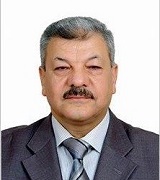| News Details |
Sustainable management of groundwater in Iraq as an invisible and overused resource
2023-12-30

Water Strategy and Policy Expert
Due to the harsh conditions that have brought about climate change, the control of neighboring countries over Iraq's water resources and the mismanagement of what is available, which has suffered decades of continuous neglect and mismanagement of issues related to good water management at all levels of government, central, local and municipal, especially groundwater sources as a result of over extraction, which have become suffering from continuous deterioration in terms of quantity and quality, which requires serious attempts to develop an integrated management of groundwater resources to be on a more sustainable path, at the very least, the Iraqi government should formulate new strategies and implement policies that should take into account the significant reduction of current rates of decline in groundwater levels, as well as the level of pollutants reaching groundwater, although achieving these policies may seem somewhat difficult, given the vested interests involved in maintaining current practices.
But if the current trends in over extraction of groundwater continue, there is no doubt that most areas of Iraq will soon face a water crisis that is so difficult to deal with easily and unavoidable in the short and medium term, knowing that there is currently enough knowledge, technology and funds available to solve water crises. Unfortunately, there are no clear signs that the solutions available and likely to be used to significantly improve surface and groundwater management practices and processes in Iraq, which ranks as the fifth most vulnerable country to climate change. The situation is further complicated by the fact that climate change makes the occurrence of meteorological events and extreme hydrological events, such as floods and droughts, more frequent, and their duration much longer.
The problem is further complicated by the fact that decision-makers in Iraq have not given water resources any long-term political priority despite the completion of a strategic study covering 20 years (2015-2035), which requires this study to be regularly updated every five years to include changing political, economic and climatic conditions as well as scientific, technological and administrative progress, however, this did not happen despite the passage of more than eight years since the issuance of this study and Iraq's urgent need to revise this study and apply what was stated in it. Attention to water resources comes when there are large floods and floods or prolonged droughts. Once these events are over, their interest in water resources simply disappears.
Unfortunately, water problems cannot be solved without sustained long-term attention by policymakers, making the situation significantly worse because political interests are generally ad hoc and short-term, and the prospects for long-term water security are steadily declining.
The perceptions of the general public, including politicians, about water is the interest and vision of surface water, which includes rivers and lakes, and groundwater is rarely part of this overall vision, so this is ironic because groundwater makes up more than 98% of the liquid freshwater on Earth.
As groundwater extraction in Iraq increases steadily and dramatically it will gradually become unsustainable over the coming decades, as a result, groundwater levels in many areas of the country have dropped by more than half a meter per year.
One of the main problems in the unsustainability of groundwater sources is groundwater laws that were passed when knowledge about scientific management was limited, and the laws still stipulate that all landowners can extract what they want from groundwater from their land, without any restrictions in the absence of the concept of groundwater as a shared community resource. Clearly understood for the extraction of groundwater from private and public wells.
The increase in the number of wells drilled for groundwater extraction is increasing dramatically and the huge withdrawals and large withdrawal rates will steadily exceed the recharge rates of the geological aquifers.
The question that arises is whether decision-makers in Iraq need water crises greater than those that hit the country and cancelled agricultural seasons to motivate them to make major changes and tight policies, including the issuance of new laws to exploit groundwater. With the effects of climate change, especially concerning long-term and severe droughts, is this not enough to change the views and attitudes of politicians, farmers and the general public towards sustainable water management, especially groundwater?
Unlike rivers and surface bodies of water such as lakes and reservoirs, whose levels can be seen by everyone, low groundwater levels are invisible and therefore not of great concern to policymakers, the media, or the general public. As Lake Mead levels steadily declined and flow levels in rivers such as the Rhine and Yangtze fell, everyone around the world became more aware of these facts. However, when groundwater levels in aquifers fall, there is no similar public information or interest. In these cases, ignorance may be a temporary blessing, but in the long run, it poses serious national issues.









